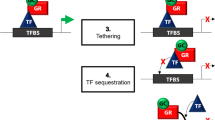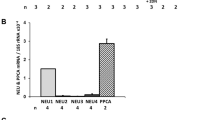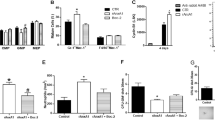Abstract
GLUCOCORTICOIDS decrease levels of circulating peripheral lymphocytes and immunoglobulins, inhibit mitogen- and antigen-induced blastogenesis of cultured lymphocytes and decrease bactericidal activity of granulocytes and other phagocytic cells1–4. Fc receptors on granulocytes are thought to play a vital part in adherence of antibody-coated particles to the surfaces of these cells, a step which initiates phagocytosis5. Factors which regulate the expression of the Fc receptor could therefore influence phagocytic capability, and it has been suggested that glucocorticoids might act in such a way6,7. We report here that glucocorticoids inhibit expression of the Fc receptor on the human promyelocytic cell line HL-60 (ref. 8). This inhibition is not accompanied by increased cell death, reduced proliferation or a general reduction in protein synthesis.
This is a preview of subscription content, access via your institution
Access options
Subscribe to this journal
Receive 51 print issues and online access
$199.00 per year
only $3.90 per issue
Buy this article
- Purchase on Springer Link
- Instant access to full article PDF
Prices may be subject to local taxes which are calculated during checkout
Similar content being viewed by others
References
Claman, N. H. New Engl. J. Med. 287, 388–397 (1972).
Baxter, J. D. Pharmac. Ther. 2, 605–659 (1976).
Butler, W. T. & Rossen, R. D. J. clin. Invest. 52, 2629–2640 (1973).
Rinehart, J. J., Balcerzak, S. P., Sagone, A. L. & LoBuglio, A. F. J. clin. Invest. 54, 1337–1343 (1974).
Dickler, H. B. Adv. Immun. 24, 167–214 (1976).
Atkinson, J. P., Schrieber, A. D. & Frank, M. M. J. clin. Invest. 52, 1509–1517 (1973).
Atkinson, J. P. & Frank, M. M. Blood 44, 629–637 (1974).
Collins, S. J., Gallo, R. C. & Gallagher, R. E. Nature 270, 347–349 (1977).
David, G. S. Biochem. biophys. Res. Commun. 48, 464–471 (1972).
David, G. S. & Reisfeld, R. A. Biochemistry 13, 1014–1021 (1974).
Unkeless, J. C. & Eisen, H. N. J. exp. Med. 142, 1520–1533 (1975).
Munck, A. & Leung, K. Receptors and Mechanism of Action of Steroid Hormones Part II (ed. Pasqualini, J. R.), 311–397 (Dekker, New York, 1977).
Crabtree, G. R., Smith, K. A. & Munck, A. Cancer Res. 38, 4268–4272 (1978).
Schrieber, A. D., Parsons, J., McDermott, P. & Cooper, R. A. J. clin. Invest. 56, 1189–1197 (1975).
Scatchard, G. Ann. N.Y. Acad. Sci. 51, 660–673 (1949).
Williams, W. J., Beutler, E., Erslev, A. J. & Rundles, R. W. Hematology 2nd edn, 593 (McGraw-Hill, New York, 1977).
Handlin, R. I. & Stossel, T. P. Blood 51, 771–779 (1978).
Author information
Authors and Affiliations
Rights and permissions
About this article
Cite this article
CRABTREE, G., MUNCK, A. & SMITH, K. Glucocorticoids inhibit expression of Fc receptors on the human granulocytic cell line HL-60. Nature 279, 338–339 (1979). https://doi.org/10.1038/279338a0
Received:
Accepted:
Issue Date:
DOI: https://doi.org/10.1038/279338a0
Comments
By submitting a comment you agree to abide by our Terms and Community Guidelines. If you find something abusive or that does not comply with our terms or guidelines please flag it as inappropriate.



